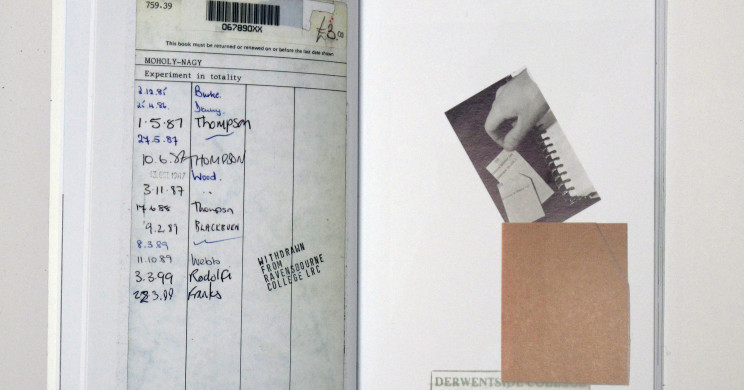Sara MacKillop’s Ex Library Book tells the story of a place of words without using many. Published with Pork Salad Press, this work seems at first to be a random photo collection of stamps and insignificant slips found in any public library book, building up a detailed picture of the public library by showcasing every element of a library book except the book itself.
By stripping away the actual contents of the books, MacKillop leaves only the stories of how the books were used by the patrons of the library, by ordinary people. These stories are told in checkout slips, in hand-scrawled notes, in “DISCARDED” stamps, and in warning notices and book inserts.
The artist introduces the story of Ex Library Book with a short paragraph on the back cover, which explains that ex-library books are the least desirable books for collectors because they are battered, stamped, taped, glued, and otherwise unattractive. By casting the subject matter in this light, MacKillop gives the viewer the pleasure of appreciating something that has up until now been tossed aside as worthless.
Because of MacKillop’s dramatic use of white space, the subject of each page stands out in sharp relief, in its truest form. It shows the confidence of the artist in her subject matter, to let it stand so on its own, without any visual aids. It is a high risk, high reward move, and MacKillop has reaped the “high reward.” Whether the subject is a half-faded “WITHDRAWN” stamp, a photo of a return slip, or a warning from the institution (such as, “In the event of infectious disease occurring, books should be returned to the Public Health Department for disinfection, and NOT to the Library”), each one demands the viewer’s full attention and appreciation.
If on the first occasion of opening this “Ex Library Book,” you find that you do not have enough time to devote the necessary attention to each page to appreciate it in full, I recommend that you pick it up again and again, several times over. It is a project that lends itself to multiple viewings. Like any well-done works of art, whenever you return to this project, you will find something you missed before. It was not until my third reading of Ex Library Book that I discovered my favorite page: a hand-scrawled note that reads, “Whoever nicked this, would they please return it. (It’s very selfish.)” That page is juxtaposed against my second favorite page, a checkout slip with the typewritten words, “Shetland Ponies,” under which, “SCIENCE AND TECHNOLOGY” has been inexplicably stamped.
But those are just my favorite pages, the tip of the iceberg, so to speak. Ex Library Book lends itself to many interpretations, in the same way that a library itself lends itself to many uses. According to the International Encyclopedia of Information and Library Science, libraries are designed “according to our image of the receivers,” i.e., a university library is designed with the interests of students and scholars in mind, while a public library caters to a more general fare. By including bits and pieces of books from university libraries, public libraries, research libraries, and more, all over the UK and the US, MacKillop has effectively dissolved the originally intended audiences and opened up the contents of her project to a much wider group.
The International Encyclopedia of Information and Library Science also had this to say about libraries: “There is good reason to believe that the root concept of the ‘library’ is deeply embedded in our way of thinking about the world and coping with its problems.” Perhaps that is why, even as more and more people choose read an e-book on their Kindle or iPad, rather than flip through the dusty pages of a worn-out library copy, there is still something innately relatable and valuable in the scraps from libraries past.
Whether it is an effect of our “deeply embedded” connection to libraries or the striking images against stark white backgrounds, Ex Library Book is an evocative piece. A library may be home to billions of words, but MacKillop encapsulates the soul of the institution in less than one hundred.
Reviewed by Jaidree Braddix
























